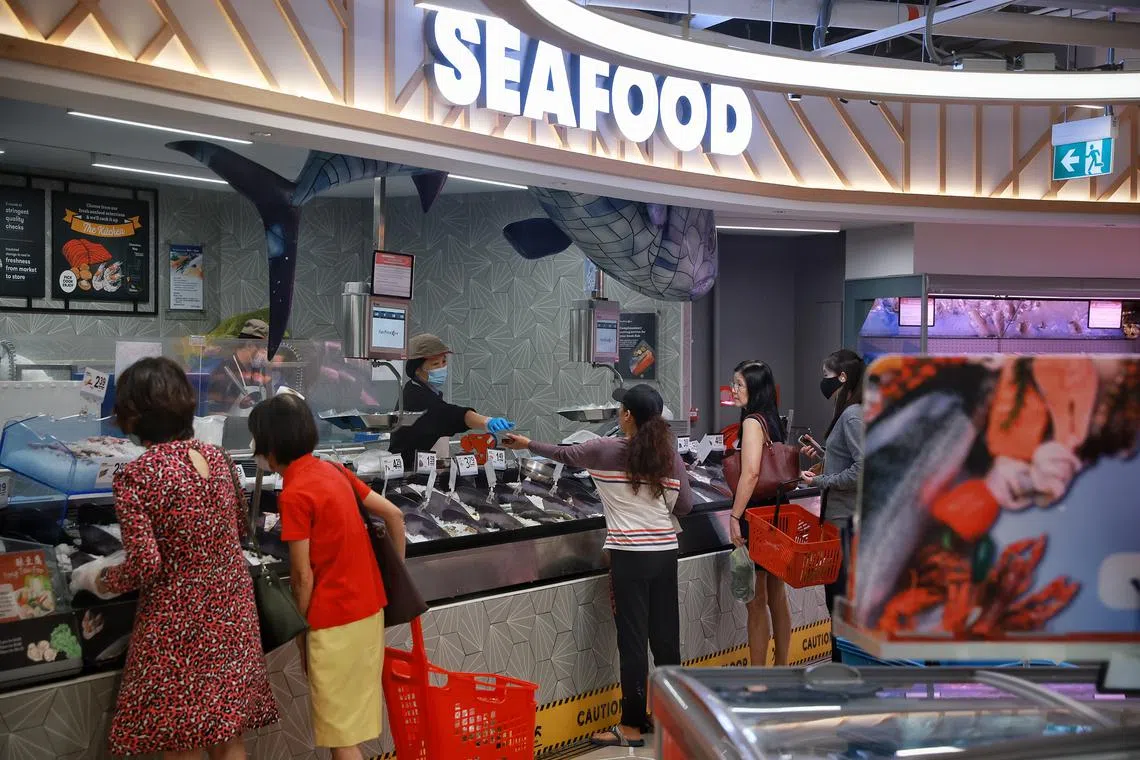No immediate ban on Japan seafood in Singapore after Fukushima nuclear wastewater release
Sign up now: Get ST's newsletters delivered to your inbox

SFA said it will continue to closely monitor food imports from Japan to ensure that they comply with Singapore’s food safety requirements.
ST PHOTO: KEVIN LIM
Follow topic:
SINGAPORE - Japanese seafood has not been banned in Singapore following the release of treated radioactive water
The Singapore Food Agency (SFA) maintained its position on the safety of food from Japan, saying its surveillance results, including for radiation, have been satisfactory.
It added that since 2013, SFA has not detected any radioactive contaminant in food imports from Japan and that food products that fail SFA’s inspections and tests will not be allowed for sale in Singapore.
But some consumers said that they will avoid consuming seafood from Japan.
Ms Olivia Choong, 44, said: “I do find it alarming but I don’t think I am overreacting. Besides, there are many other options for seafood in Singapore.”
The president and co-founder of non-profit group Green Drinks Singapore added: “While I enjoy eating sashimi, it’s not something that I need to include in my diet.”
Agreeing with her is part-time trainer Hong Yu, 70, who will avoid seafood altogether, and opt for bottled mineral water whenever possible.
She said: “The water released will go everywhere. I’m not very sure about the impact on my health if I were to drink tap water.”
In response to queries from The Straits Times on whether Singapore will be following the likes of China and South Korea in banning seafood imports from Japan, SFA referred to a parliamentary response made by Minister for Sustainability and the Environment Grace Fu on Aug 3.
In it, she stated that since 2019, the National Environment Agency (NEA) has been closely monitoring Singapore’s waters as part of its environmental baseline radiation monitoring programme, and found that “radioactivity measured continues to remain within our natural background levels”.
When contacted by The Straits Times, Sakuraya Foods, which imports and retails fish and other food from Japan, said it has not received any feedback or concerns about Japanese seafood from consumers.
While it does not import any seafood from Fukushima, it is closely monitoring updates for food import restrictions by SFA and Japanese government agencies.
Singapore lifted pre-export tests and Certificate of Origin requirements on approved food imports from Fukushima from May 28, 2021 – about 10 years after Japan’s twin natural disasters of a 9.0-magnitude earthquake and tsunami that caused the Fukushima nuclear accident in March 2011
Food imports from Japan have consistently made up less than 1.5 per cent of total food imports in the past decade, with food imports from Fukushima measuring an “insignificant” less than 0.01 per cent of total food imports in 2022, according to SFA.
Ms Ang Ziqin, 32, said that despite being concerned, she will not avoid any seafood imports from Japan because she does not foresee any negative health impacts.
She added: “My consumption of seafood from Japan is not very high because it is quite expensive. I only occasionally order seafood at restaurants, so I think it’s okay if I ingested some amount of contaminated food.”
SFA said it will continue to closely monitor food imports from Japan to ensure that they comply with Singapore’s food safety requirements.

